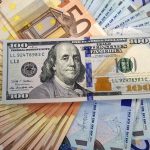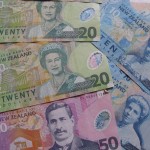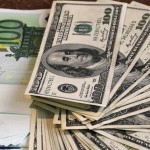The euro distanced from earlier highs against the US dollar on trading Thursday, after it became clear that French economy shrank and German economy decelerated its pace during the third quarter of the year.
Having climbed to as high as 1.3495 at 0:15 GMT on Thursday, EUR/USD cross slipped lower to trade at 1.3465 at 8:19 GMT, down 0.15% for the day. Support was likely to be found at November 12th low, 1.3358, while resistance was to be seen at November 7th high, 1.3529.
According to preliminary data, French economy contracted 0.1% during the third quarter of the year compared to the second quarter, following a 0.5% gain in Q2. The annualized GDP figure grew 0.2% in Q3, slowing down in comparison with the revised up 0.5% gain in Q2 (0.4% gain previously). Experts had expected a 0.3% climb during the third quarter.
Additionally, German preliminary Gross Domestic Product rose 0.3% in the third quarter, compared to the second three months, meeting expectations but decelerating in comparison with Q2, when economy grew 0.7%. On annual basis, Germanys GDP climbed 1.1% in Q3, following a 0.9% gain during Q2.
Euro zone’s economy probably expanded 0.1% during the third quarter, an official report is expected to reveal later in the day, based on a survey of economists by Bloomberg. Regions Gross Domestic Product rose 0.3% in the previous three months, which actually marked the end of the longest recessionary period ever recorded.
The common currency snapped three-day gains, after European Central Bank executive board member Peter Praet stated that the central bank could use negative interest rates. “We think that the risks to price stability are broadly balanced as a result of the measures we took, and we are going to assess the situation,” Praet said in a Bloomberg Television interview. The European Central Bank may consider using negative interest rates, but however, “we should not jump immediately into the next measure”.
“There’s no reason to buy the euro from the relative fundamentals perspective,” Marito Ueda, senior managing director at FX Prime Corp. said, cited by Bloomberg News. “I expect further easing from the ECB.”
Meanwhile, current Federal Reserve Chairman Ben Bernanke said earlier on Thursday that he wished to see US economy in a better shape, with the rate of unemployment staying at 5% and not at the current 7%, when he steps down from his governing post in late January.
At the same time, Federal Reserve Chairman nominee Janet Yellen said in a statement released on Wednesday, that US labor market and economy as a whole were “performing far short of their potential”. According to Yellen, the economy has demonstrated a certain progress, but the rate of unemployment in the country still remains “too high”. These remarks boosted market expectations that the central bank will probably continue its monetary stimulus program, in order to navigate US economy towards a stable growth.
According to the median estimate of 32 economists in a poll, on the other hand, the Federal Reserve will trim the monthly pace of its asset purchases to 70 billion USD at the policy meeting on March 18th-19th from the current 85 billion USD per month.
Elsewhere, the euro was slightly lower against the sterling, with EUR/GBP cross dipping 0.08% on a daily basis to trade at 0.8394 at 8:54 GMT. EUR/JPY pair was advancing 0.45% to trade at 134.46 at 8:56 GMT.





